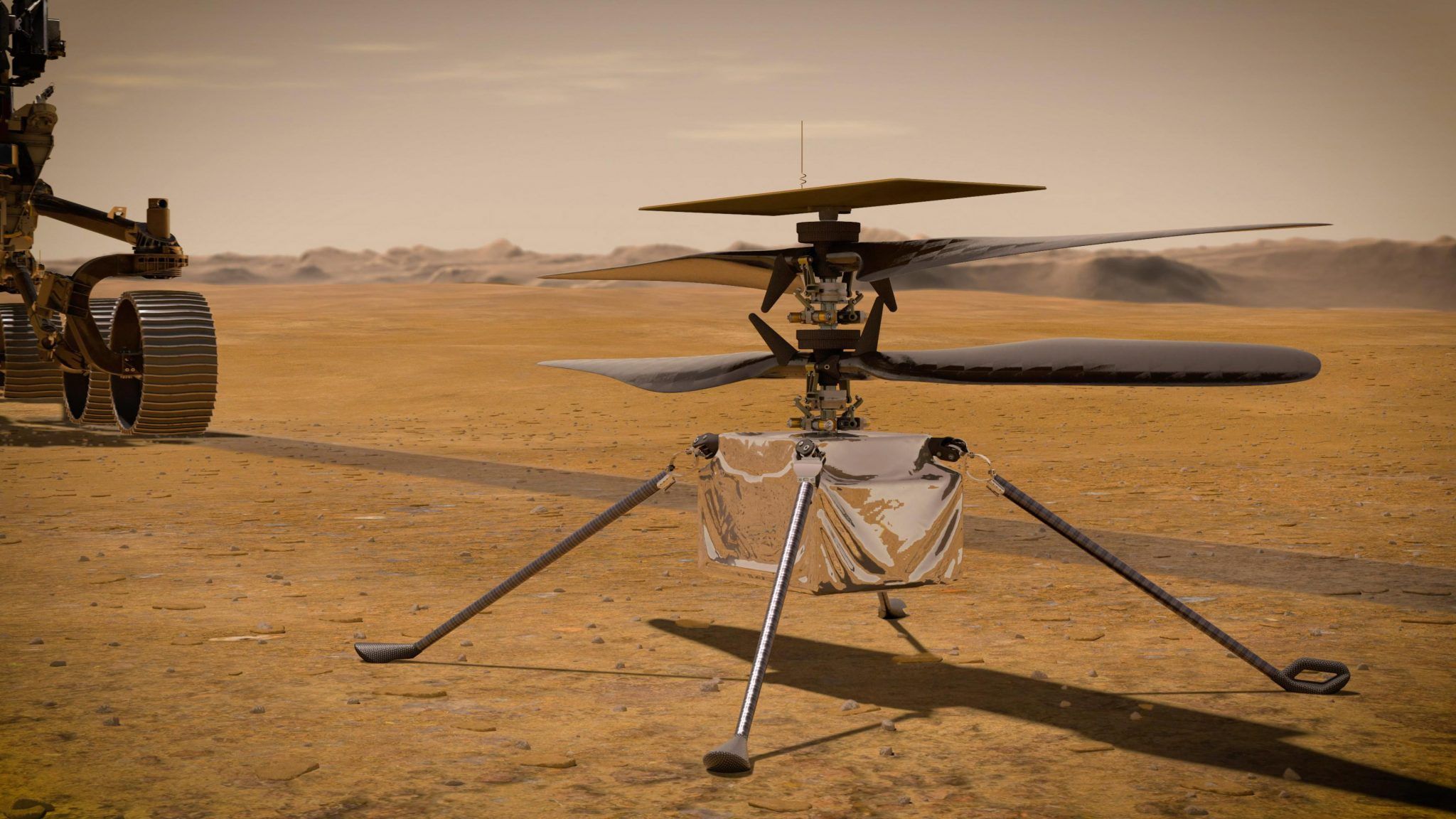Jacksonville Native’s Work Part of Mission to Mars
Article by Samantha McDaniel-Ogletree August 12, 2020 (myjournalcourier.com)
• When Jacksonville, Illinois native Susan Gorton was in high school, she and her family took a vacation to Houston where she decided she wanted to be a part of NASA. Today she is the manager of the Revolution Vertical Lift Technology Project which helped design the helicopter ‘Ingenuity’ that is now on its way to Mars with the Rover Perseverance. It is scheduled to land on Mars in February.
• Gorton was approached by NASA’s Jet Propulsion Laboratory to develop a helicopter that could fly in the Mars atmosphere. A helicopter allows more exploration than a rover alone could provide. “The rover can only see ahead like 10 meters, so they wanted something that could act like an aerial scout,” said Gorton. The softball sized helicopter was conceptualized by the Jet Propulsion Laboratory and developed and tested by Gorton’s team starting in 2013. In 2018, NASA announced it was moving forward with the project. “I never would have guessed that this is where I’d end up,” said Gorton.
• The Ingenuity helicopter is softball-sized, (four pounds heavy, with twin 4-foot rotor blades). Because no one would be directly in control of its operations, the helicopter needed to have some autonomy to correct its flight patterns and balance. Among the problems the team had to navigate were an atmosphere that is 95% carbon dioxide and temperatures that range from minus 14 degrees to minus 117 degrees Fahrenheit or lower. The helicopter will be able to communicate with the rover and send pictures, which the rover will relay to NASA Mission Control. Mission Control will relay instructions to the helicopter through the rover.
• This demonstration model will prove whether a helicopter can operate on Mars. Another model will be developed if it is functional. “It’s an exciting time — a feeling of ‘boy, I hope this works,’” Gorton said. “We won’t know for sure if we did it until it reaches Mars.” “If it is successful, [it opens] up the landscape of another planet, the ability to explore much more of [a] planet. It’s a leap forward in extraterrestrial exploration.”
• [Editor’s Note] I think that NASA is exaggerating the atmospheric conditions with which the Ingenuity helicopter must contend. A 95% carbon dioxide atmosphere shouldn’t affect the air pressure. But several secret space program whistleblowers have said that the Martian air is breathable, so long as you aren’t running wind sprints. They would typically carry along an small oxygen tank on the surface of the planet for whenever they felt they needed more oxygen. And the Mars sky is blue, which is an indication of an oxygen-rich atmosphere. So Mars likely contains more oxygen than NASA is letting on. Also, whistleblowers do not report that Mars’ temperature never gets above minus 14 degrees Fahrenheit. The temperature on Mars is much more comfortable than NASA is telling us. For some reason, NASA doesn’t want the public to know just how hospitable Mars really is. Is this a ploy to delay public exploration of Mars for as long as possible? Do they not want us to find out that not only are there over a dozen Interplanetary Corporate Conglomerate (deep state) human work colonies and an allied Nazi ‘Dark Fleet’ Mars Defense Force already established on Mars (below ground), but several indigenous races still living on the planet as well?
As a Routt Catholic High School sophomore on summer vacation with her family in Houston, Susan Gorton found her dream.
She wanted to be a part of NASA.

For the Jacksonville native, seeing the space agency’s visitor center started her along a path that took her to manager of the Revolution Vertical Lift Technology Project.
Now, a softball-size helicopter she helped design and test is making its way through space on its way to Mars.
“I never would have guessed that this is where I’d end up,” Gorton said. “I wouldn’t have guessed something I helped with would be in space.”
Gorton said most people think of just astronauts and space when they think of NASA, but the program is also studying aeronautics, such as airplanes and helicopters.
“We do a lot with research on how to make vehicles better,” Gorton said.
In her department, Gorton focuses on vertical-lift vehicles, making them faster, quieter and safer.
Gorton was approached by NASA’s Jet Propulsion Laboratory about a project to fly a helicopter in the Mars atmosphere. The goal is to allow aerial scouting and more exploration than a rover would be able to provide.
“They were developing a rover going to Mars and they were working on how to get something on Mars that can move ahead of the rover,” Gorton said. “The rover can only see ahead like 10 meters, so they wanted something that could act like an aerial scout.”
She and her team helped develop the Mars Helicopter Ingenuity, which launched as a part of the Mars 2020 Rover Perseverance on an Atlas V rocket on July 30. It is scheduled to land on Mars in February.
FAIR USE NOTICE: This page contains copyrighted material the use of which has not been specifically authorized by the copyright owner. ExoNews.org distributes this material for the purpose of news reporting, educational research, comment and criticism, constituting Fair Use under 17 U.S.C § 107. Please contact the Editor at ExoNews with any copyright issue.
